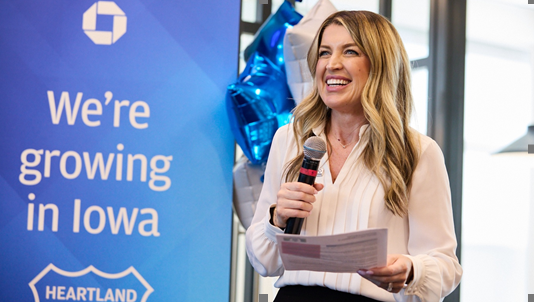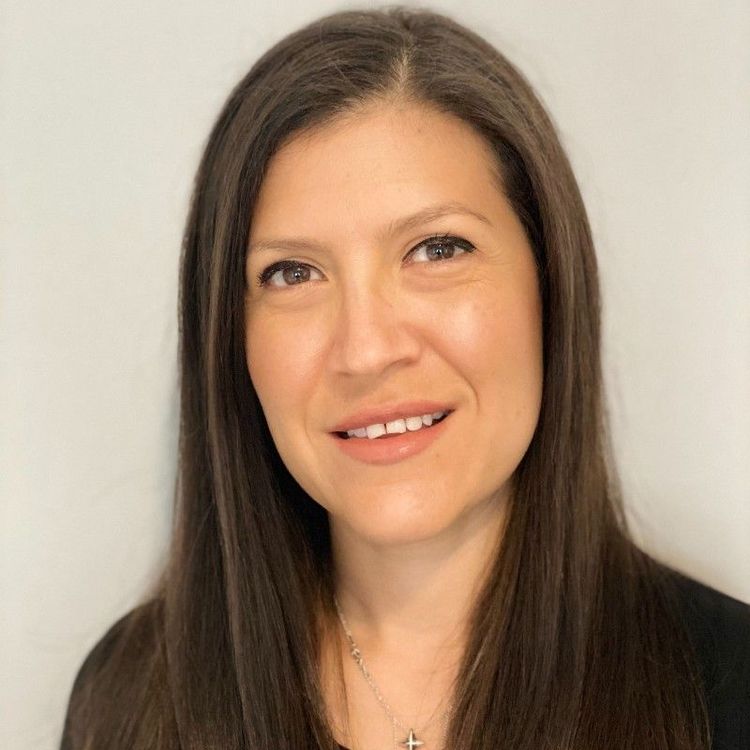Dear reader,
Welcome to the latest edition of The Forum File. In this edition, we are highlighting one bank’s work to expand affordable homeownership opportunities for people in underserved communities.
We hope you enjoy reading this edition and please do not hesitate to share your feedback.
Kevin Fromer, President and CEO, Financial Services Forum
Penny for Your Thoughts
Abigail Suarez, Head of Community Development, Corporate Responsibility
Describe how JPMorganChase is taking a holistic approach to addressing the housing crisis.
As a firm, we’re committed to expanding economic opportunity and driving inclusive economic growth. When communities thrive, our business does, too. The housing crisis is complex and requires multifaceted solutions, which is why our strategy aims to tackle both housing supply and demand constraints. We are leveraging our philanthropic dollars, business practices, and policy expertise as part of a coordinated, holistic approach to make housing more accessible and affordable. To give a recent example: in an effort to expand homeownership opportunities for underserved communities, we announced a $20 million philanthropic commitment to non-profit organizations working to address this issue, expanded access to a consumer lending product that provides eligible customers with lower interest rates or down payment assistance, and published policy recommendations for Advancing Affordable, Sustainable Homeownership. Our combined resources and expertise enable us to deliver impact alongside our local partners.
JPMorganChase recently released a paper on Tackling Persistent Residential Vacancy, Abandonment, & Disrepair, which outlined place-based strategies to tackle housing supply. How are you implementing these strategies in your own work?
Households across the country are struggling to find affordable places to live, but the solutions to this issue vary depending on the market—in some areas the answer is increasing housing production, while other areas may need strategies to reactivate vacant or abandoned homes as safe places to live. This paper on residential vacancy is part of our What Works series, which shares insights and lessons learned drawn from our experience working with public, private and community partners to drive inclusive economic growth. The paper discusses the importance of building local capacity to address housing affordability challenges, a principle reflected in a $6 million commitment we made in Baltimore to increase affordable homeownership and stabilize housing supply. Our approach is informed by over half a decade of partnership with local city organizations and leaders who are finding innovative approaches to reduce the number of vacant homes in Baltimore. Working in silos is rarely effective, and we’re proud to show up in local communities as listeners and partners to tackle big challenges and catalyze progress.
Another obstacle to homeownership is the problem of heirs property. Why is tackling heirs property important and what is JPMorganChase doing to address it?
Homeownership is a primary means of building and passing wealth across generations—however, the issue of heirs property puts this at risk. Heirs property occurs when a homeowner dies without a will and their property is informally inherited by multiple descendants. Left unaddressed, this unstable homeownership status compromises the ability of residents to pass the property on to descendants and makes them vulnerable to foreclosure or a forced sale. To address this issue, we announced more than $9 million in philanthropic funding to support free legal assistance, estate planning services, and appraisal reform in underserved communities, as well as highlighted support for state and federal policy reforms to address this issue. We also published papers on Supporting Heirs Property Owners Through Natural Disaster and Resiliency Programs and Solutions to Build Household Wealth by Addressing the Undervaluation of Property to amplify insights and recommendations informed by our business, philanthropic, and policy expertise. By addressing the problem of heirs property, we can help more individuals benefit from the generational wealth-building power of homeownership.
Value Add
JPMorganChase announces plans to expand access to consumer, business and community banking services

JPMorganChase has committed to open more than 500 new branches, renovate approximately 1,700 locations and hire 3,500 employees across the country over the next three years. This multi-billion dollar commitment will contribute to local economic growth through construction, ongoing community investments and local hiring, bringing opportunity to thousands of local residents.
As part of this nationwide expansion, CEO Jamie Dimon, senior leaders from across the firm, community partners, employees and elected officials came together in Des Moines to announce the expansion of the firm’s services to customers and communities across Iowa. The firm’s Iowa footprint will expand from eight branches to more than 30 across the state by 2030, including new branches in Des Moines, Waterloo, Cedar Rapids, Sioux City, Iowa City and Ames. This commitment is part of the firm’s broader goal to serve 50% of the population in each of the 48 contiguous states within an accessible drive time and builds on 39 years of support for clients and communities in Iowa.
Capital Gains
What we’re doing in Washington
Forum President and CEO Kevin Fromer issued a statement following Federal Reserve Vice Chair for Supervision Michael Barr’s remarks on U.S. capital regulations. “We look forward to reviewing the revisions and participating fully in the public comment process. Getting this right is essential for the U.S. economy,” Fromer said.
Our Two Cents
Research from the Forum
The BankNotes Blog Spotlighted:
- A report from the Government Accountability Office on the banking agencies’ regulatory analysis, which emphasizes significant implications for finalizing the Basel III Endgame capital proposal.
- The strong liquidity profile of Forum members and the need for thoughtful and data-based analysis before proposing new liquidity regulations for large banks.
- A proposal by the Federal Reserve and global regulators through the Basel Committee on Banking Supervision to increase the cost and burden of GSIB score reporting, which is not supported by regulatory data on both GSIBs and non-GSIBs.
Members in the News
Bank of America celebrated two decades of supporting youth employment and economic opportunity through its signature philanthropic program, Student Leaders. The program has provided 4,500 students with work experience and leadership skills to help build future careers.
BNY sponsored America250’s “America’s Field Trip,” a nationwide scholastic contest encouraging students to reflect on what America means to them. The firm helped bring 75 students from 27 states and territories to the nation’s most historical and cultural landmarks including the New York Headquarters of BNY, the country’s oldest bank.
Citi’s latest Securities Services Evolution whitepaper focuses on the next frontier for the industry with the growing applicability of technologies, including distributed ledger technology and digital assets, and the significant potential for tokenization. Watch an explainer video and read more on these developments that continue to transform the securities landscape in the whitepaper.
Goldman Sachs 10,000 Small Businesses announced an expansion of the program to Alabama, which includes a $3 million commitment to community development financial institutions focused on small businesses, and marks the initiatives fifth launch state to date – on track to meet its goal of reaching 20 states in five years.
JPMorganChase announced joint policy recommendations and a $6 million commitment to UnidosUS focused on building organization capacity and supporting homebuyer readiness, expanded access to credit, increased housing supply, and the preservation of Latino homeownership.
Morgan Stanley celebrated the 2024 graduates of its Small Business Academy, a partnership between its Supplier Diversity Program and the Institute for Inclusion. Through 12 weeks of instructor-facilitated learning and a year-long mentorship program, the Academy enables small businesses to differentiate themselves in the procurement process, strengthen their business acumen and expand their professional networks.
State Street announced an issuance of $1 billion of senior debt, which includes five broker-dealers owned by underrepresented groups who have underwritten 40% of the securities in the issuance.
Wells Fargo shared its recent community impact report of the company’s Open for Business Fund, a roughly $420 million national small business recovery effort to help those hardest hit during and after the COVID-19 pandemic. Launched in 2020, grantees report the Open for Business Fund has now benefited more than 336,000 small businesses, empowering them to keep or create more than 461,000 jobs in communities across the nation.
